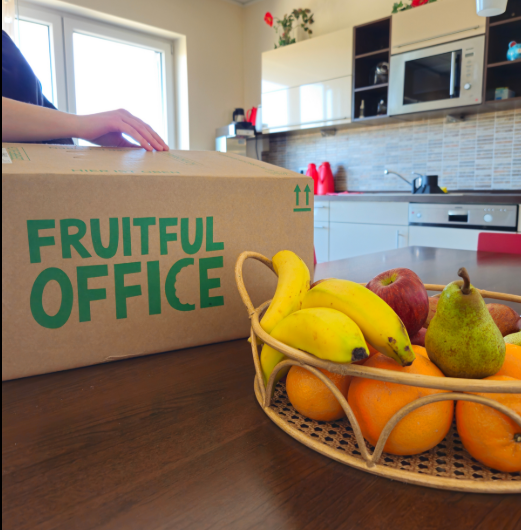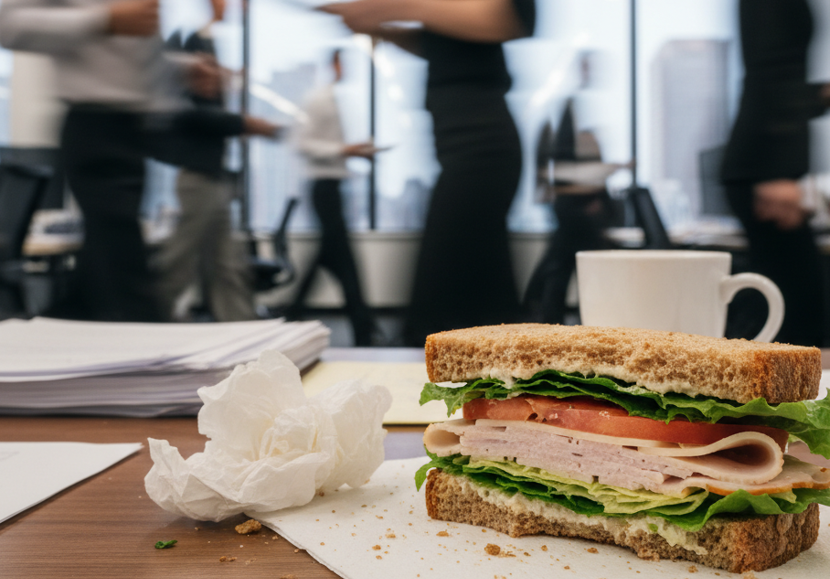Did you know that ‘International Fruit at Work Day’ happened last month? If you missed it on the first Tuesday of October, you’re not the only one (It was only my first year remembering to celebrate it, honestly). Most of you were probably grabbing a second or third coffee… or raiding the communal biscuit tin rather than reaching for the humble apple. But that simple choice between fruit and processed snacks is affecting much more than the vanity metrics of fashion sizes we all obsess over.
As I’ve discussed in last month’s piece about eating distress in corporate environments, the relationship between women and food in high stress workplaces has become increasingly complex. UK stats are showing that women aged 25 to 44 feel stressed for more than 12 days per month on average, nearly four days more than their male colleagues. When pressing deadlines start to loom and teams meetings stack up we are turning to whatever’s quickest, most accessible and yes, comforting. (I’m not going to lie and tell you an apple comforts me the same as a king size snickers bar). Usually, that accessibility is coming from the vending machine or that perpetual plate of pastries that I have a love/hate relationship with.
Office Fruit Delivery
But what if healthier options were just as convenient? That’s where our office fruit delivery came in. We’ve been using Fruitful Office (a London based service that delivers fresh fruit baskets directly to workplaces across the city) for just over two years now, so I feel comfortable in touting the benefits our team have seen directly from this subscription as well as sharing insights some of our clients have from their own office fruit subscriptions.
Fruitful are quietly revolutionising how we snack at work. They’re making it as easy to grab a banana as it is to reach for a chocolate bar. For me, this removes the single major hurdle when it comes to impulse eating. In the same way I will drink twice as much water if I have my bottle nearby… if fruit is in sight I’m reaching for it before I walk a few flights of stairs to the vending machines. I can be a lazy person at times. I’m also a creature of habit, which plays into the office fruit basket ethos quite nicely – once you start snacking from it, soon you’ll notice if it’s not there!
There’s some compelling science backing this up too. Research from the WHO found that office wellness programs, including office fruit deliveries, reduced healthcare costs by more than a quarter. Adults who regularly eat ‘nutrient rich foods’ show reduced symptoms of depression and greater psychological wellbeing. For women navigating the unique pressures of corporate life, where we’re still fighting for equal pay while juggling multiple roles, these can be crucial lifelines.
I’ve seen firsthand how office fruit transforms workplace dynamics. Walking into a meeting room for the first time and finding a box of free fruit offers aa subtle change in the energy. The 3pm slump becomes manageable without the ‘sugar crash tax’ that inevitably follows that sweet, sweet biscuit fix. Team members start conversations around the fruit bowl that wouldn’t happen otherwise. There’s something inherently nurturing about an employer who provides fresh office fruit for their staff, it signals they value your wellbeing beyond just your productivity metrics. I do really mean this BTW, I’m not being paid in free fruit baskets (I wish!)
Sustainability matters
The sustainability ethos behind this matters too in my opinion. I can’t say this is the case for every office fruit delivery company but with Fruitful, fruit comes in a fully biodegradable crate that the guys pick up and reuse many times over. It’s a feel-good difference compared to the one-use wrappers from processed snacks. For companies serious about their environmental commitments, office fruit delivery offers a tangible way to reduce waste while supporting employee health. Many services source from local farms when possible, reducing transport emissions and supporting British agriculture. Although there is a limit to this (I don’t know any British farmers successfully growing bananas…)
Implementation couldn’t be much simpler either. Most office fruit delivery services offer flexible deliveries and allow you to adjust quantities based on your team size. Seasonal variety keeps things interesting, autumn brings crisp apples and pears, summer offers berries and stone fruits. An office fruit basket can be surprisingly cost effective; it’s typically less than what companies spend on coffee or Friday drinks, yet the health benefits far exceed either of those.
Changing workplace eating culture takes time. Some of us will always prefer their KitKat break, which is totally fine. What works, in my experience, is starting small. Begin with a small trial that explores a variety of different fruits and health snacks. Track consumption, snack preferences and feedback about energy levels, afternoon productivity and team morale. The results often speak for themselves.
For women especially (after all, that’s who I’m writing for), having readily available healthy options removes one decision from our already overloaded mental bandwidth. We don’t have to pack snacks or feel guilty about skipping lunch then binging on biscuits. The fruit is staring you in the face, making the healthy choice the easy choice.
The connection between the workplace stress and eating distress patterns isn’t going away. When work pressure intensifies, our relationship with food often becomes fraught. Office fruit isn’t a magic solution, but it’s a practical step towards creating work places that support rather than sabotage our wellbeing.
Next October, when International Fruit at Work Day rolls around again, perhaps more of us will actually remember it. Better yet, maybe it won’t feel like a special occasion because fresh fruit at work will have become your new corporate normal. Until then, consider this your invitation to start the conversation in your workplace. Because sometimes the small change, like swapping biscuits for bananas, creates the biggest impact on our daily wellbeing.



